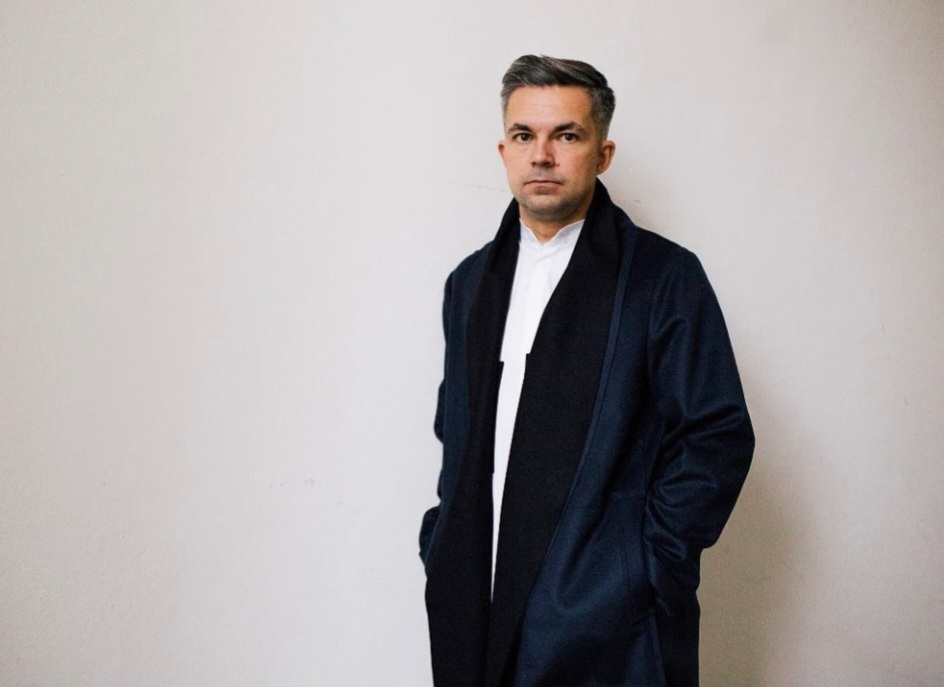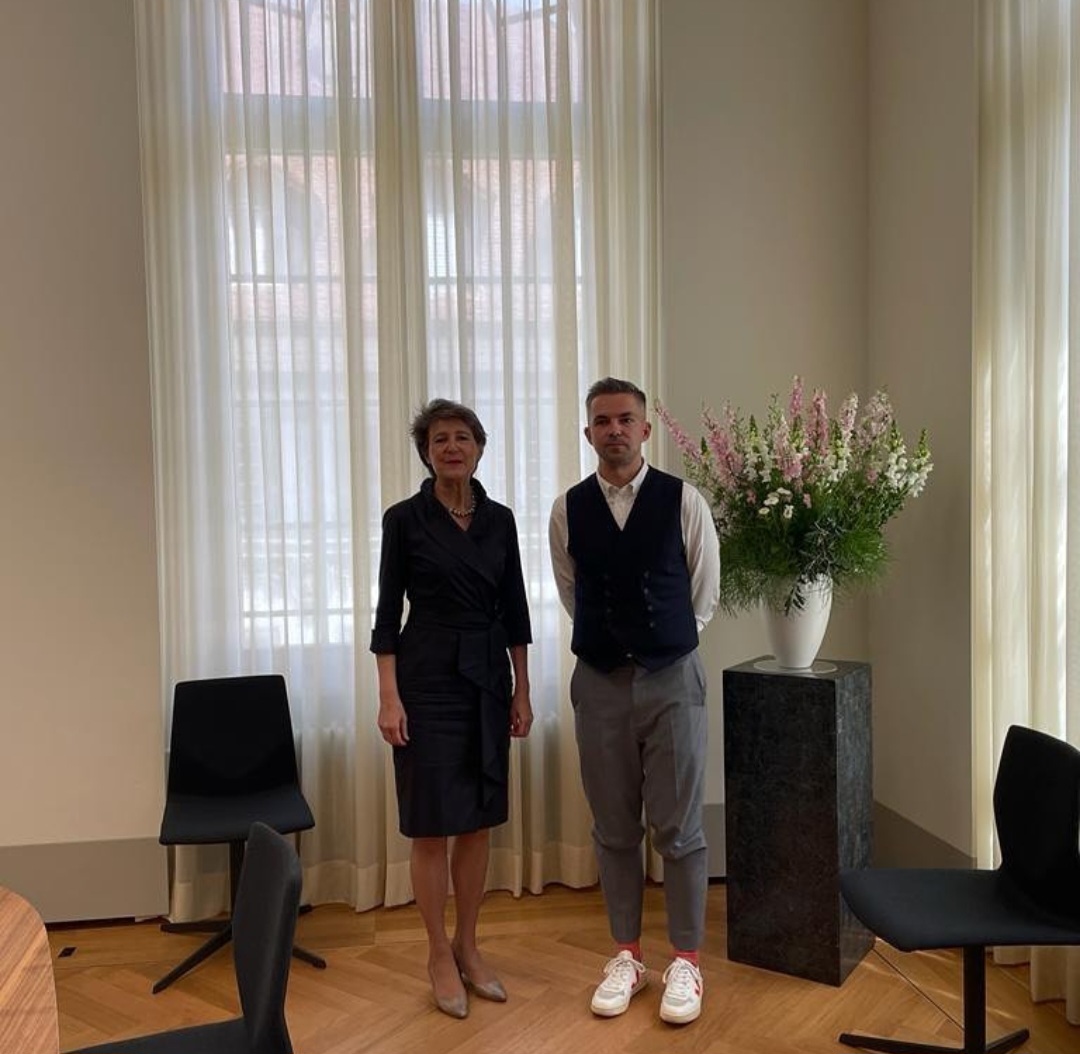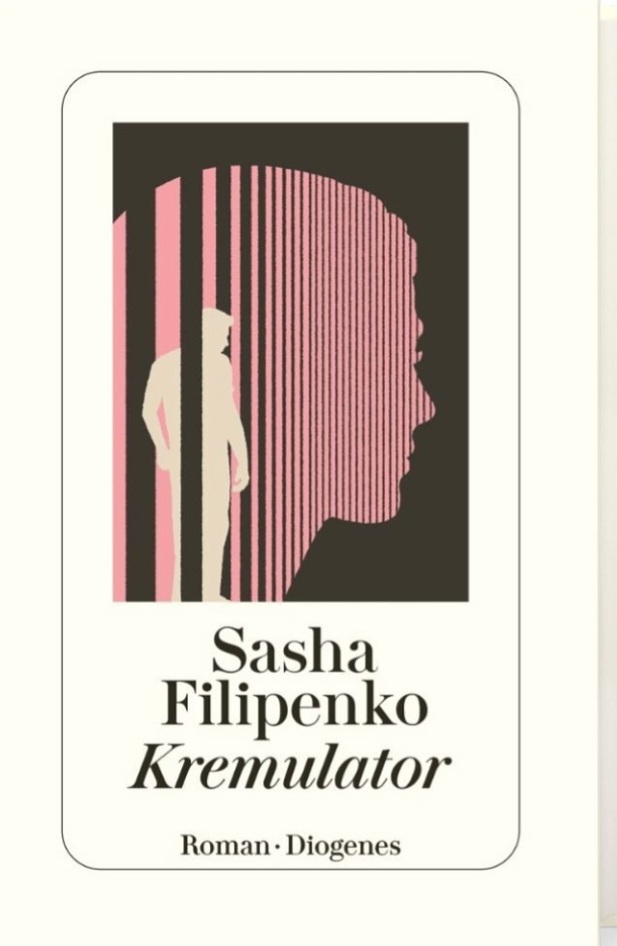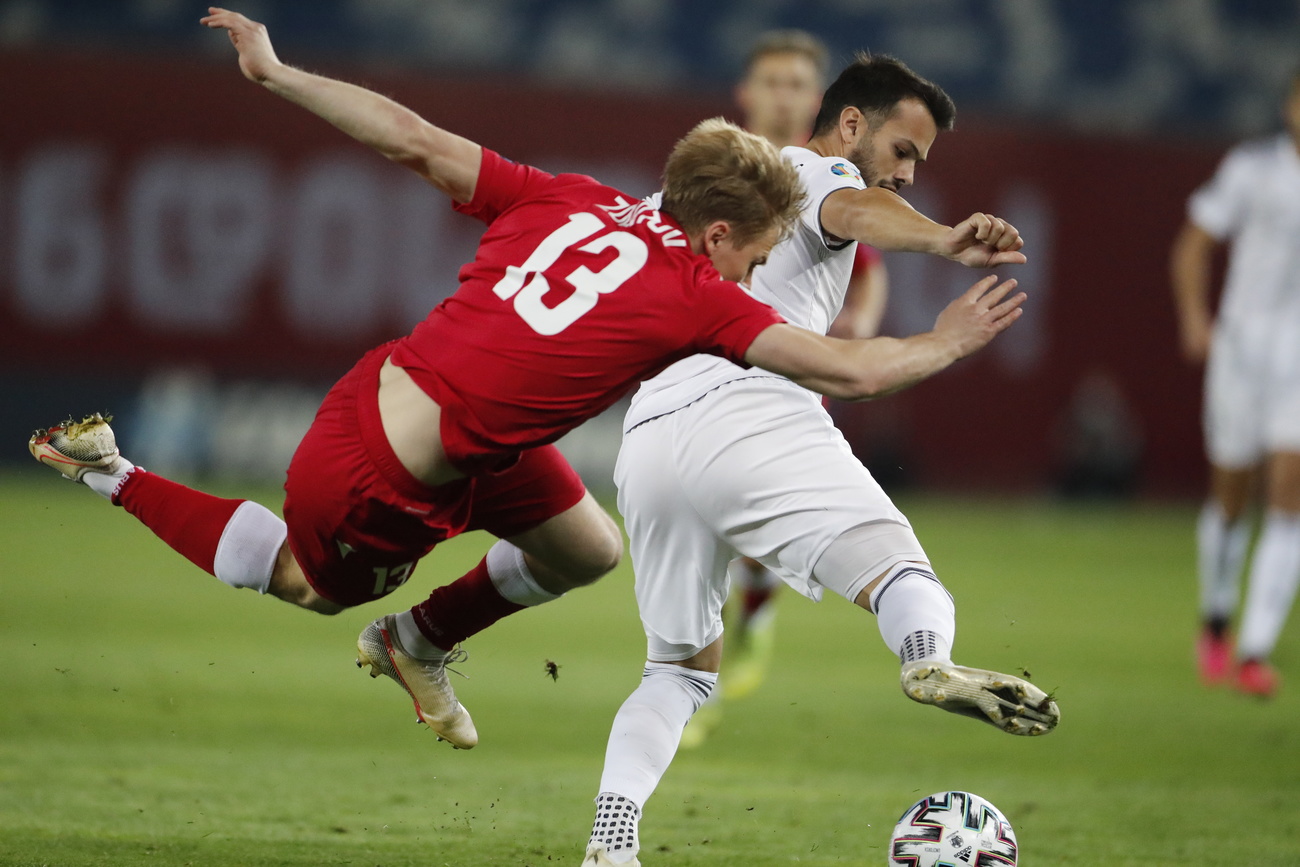Sasha Filipenko: ‘The Russian language is not Russia’s property’

The Belarusian writer and journalist Sasha Filipenko insists on writing in Russian. Living in self-imposed exile in Basel since last summer, he talks to SWI swissinfo.ch about war, protests, cancel culture and his work.
SWI swissinfo.ch: You often say that Europe has ‘abandoned’ Belarus. Has the war in Ukraine changed that in any way?
Sasha Filipenko: There is no such country as Belarus on the European agenda. I was giving a speech in Geneva recently, and a Swiss journalist said to me, ‘What right do you have to talk about Belarus in view of what is going on in Ukraine?’
We all are concerned about what is happening in Ukraine. We want the war to end immediately. We want Ukraine to win, but that does not change the fact that right now nine million people in the centre of Europe actually remain hostages [to President Alexander Lukashenko’s policies]. In 2020, during the anti-government protests, everyone admired the Belarusians. Now, suddenly we have turned into co-aggressors.
Ukrainian politicians do not recognise Sviatlana Tsikhanouskaya [Belarusian opposition candidate in the rigged presidential elections of 2020, who lives in exile in Lithuania]. But some of them recognise Lukashenko when it suits their interests, while saying that Belarusians should be more pro-Ukrainian.
Sasha Filipenko was born on July 12, 1984, in Minsk, Belarus. He moved to Russia and studied in St Petersburg, where he worked as scriptwriter for several TV shows.
After publishing several critical articles about the Lukashenko regime in 2020 in the Western press, he decided to leave Russia fearing persecution. In 2021, he wrote an open letterExternal link to Peter Maurer, the president of the International Committee of the Red Cross (ICRC), which was published in several European newspapers, protesting against the humanitarian organisation’s reluctance to inspect Belarusian prisons, where victims and international NGOs claim that torture of political prisoners still goes on.
Filipenko is the author of the books Red Crosses, Die Jagd (The Hunt), Ex-Son, Zamysly, Vozvrashhenie v Ostrog, Kremulator, which have been translated into 15 languages. His latest novel Kremulator was published in German in February 2023 by Diogenes, a Swiss publishing house.
SWI: Often those people who urge Russian or Belarusian citizens to speak out or protest locally reside safely in Europe.
S.F.: Sure, but I ask myself why can’t Europe set an example and take to the streets and speak out against commercial relations with RussiaExternal link, for instance. Only five European countries – Finland, Sweden and the Baltic states – have maintained the status quo or reduced the volume of sales with Russia. Even Poland, which is opposing the war so ardently, has expanded trade with Russia significantly, as well as Switzerland and the Netherlands. It seems that some Europeans prefer half-measures.

Today, Russian society is extremely atomised; everybody is living on their own. People may not support the regime, but they don’t go out on the streets to protest against it for a variety of reasons. For many of them the war is a real catastrophe, but for others it is far away, as was the case with the war in Afghanistan. There were no real protests then either.
They do not see this war as ‘their own’ because they do not see themselves as members of that society. They refuse to participate in elections; their vote means nothing. For them, the aggression against Ukraine is a war waged by the Kremlin.
Polls show that Russian people support this war, but I don’t think we’ve got any true numbers to rely on. People do not say what they really think but what they are expected to say.
Spending on propaganda has increased in Russia, relatively more than spending on the military. Putin is more afraid of his own people than of Ukraine. And propaganda is going to be needed for a long time to come. Right now, in a “battle between the television and the fridge” [the tension between propaganda-fueled patriotic euphoria and a darkening economic reality], TV is winning. Soon, that may change, and people will have to be told why the quality of their life is so low.

More
Belarus is not like Ukraine – and why that matters
SWI: Is Lukashenko a trustworthy partner of Russia in this war? Does he really support Putin or does he simply have no other choice?
S.F.: Putin and Lukashenko despise each other. Lukashenko is still flirting with Ukraine and will change his mind ten times over. It is open to question whether he’s going to open the border to let the Russians through. Lukashenko will try not to involve his army until the last moment. First, because it is small and will be crushed quickly. Second, because he needs to defend his regime. He is going to stick to this course to the very end; otherwise, he is going to face a real disaster.
SWI: Let’s talk about your work. Once, you called yourself a ‘Stanley Kubrick in literature’. What did you mean by that?
S.F.: Kubrick made films in different genres, and I let myself experiment in literature. I’ve written a historical novel in the form of an ancient Greek tragedy. I like trying something new in literature.
SWI: You write only in Russian, don’t you?
S.F.: Yes. Even though I studied at secondary school in Belarusian, I do not have dreams or make jokes in it. I am certain that the Russian language is not Russia’s property. That is why I see it as my task to reiterate over and over again that Russian is our language too. Speaking Russian does not mean sharing the imperial ambitions of the Russian President – although social media users are quick to tell me how wrong I am.
Switzerland, with its linguistic diversity, is a perfect example that proves my point. You speak French, but you are not French. And you don’t become Italian by speaking Italian. It is the same with Russian. People still speak it even in Ukraine, although no one has done as much as Putin to make people stop using Russian there.

SWI: Have you experienced any cancellation of Russian culture in Europe?
S.F.: I myself have been partially affected by it. In 2014, I received the Russian Prize, a very important award for my anti-dictatorial book Ex-Son. One European website has removed this fact from my biography.
Some people think that cancelling Russian culture will help; I’m not one of them. I believe that we must stop cooperating with those who openly support the war. Alternatively, we could let those artists perform, but inform the audience beforehand that this conductor or this singer totally supports Russia’s aggression against Ukraine.
I am against cancelling all Russians, the entire culture, not least because it would violate the presumption of innocence. Besides, the war will end sooner or later, while the fundamental mistakes we made – and we will make them – will remain.
Many Belarusians understand that. In 2020, the whole of Europe loved and admired us. Then in 2022 banks in Europe refused to open bank accounts for us and people started to call us co-aggressors. In other words, we were cancelled. You may say, ‘No, I am not a co-aggressor. I marched in protests while you continued to trade with Russia’, but nobody cares any more.
SWI: And how should the West, particularly Switzerland, deal with this situation?
S.F.: The West is also heterogeneous. But there is one trend that I see almost everywhere in Europe. It could be illustrated by a story that happened to me in Stuttgart [in Germany] in 2021.
I had just had knee surgery and was walking around with crutches. I was getting out of my car, getting my bags out. It was slow and very difficult. Suddenly, I saw a neighbour coming down the stairs walking towards me. ‘Oh, at last, help is coming’, I thought.
He approached me and said, ‘Don’t scratch my car’, then walked away. It was an ugly old car. It is the same with Europeans – some of them are very afraid of being scratched and act on that logic.
Edited by Eduardo Simantob and Virginie Mangin

In compliance with the JTI standards
More: SWI swissinfo.ch certified by the Journalism Trust Initiative













You can find an overview of ongoing debates with our journalists here . Please join us!
If you want to start a conversation about a topic raised in this article or want to report factual errors, email us at english@swissinfo.ch.